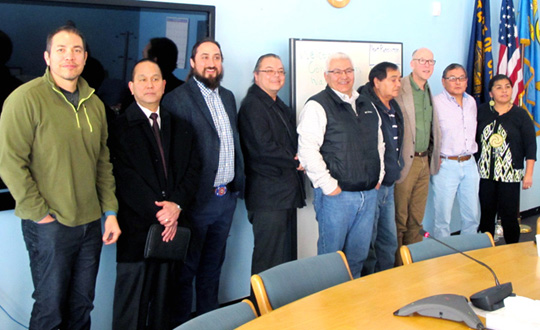Tribal member health care, funding issues with the BIA, natural resources, and the tribal cannabis project were among topics tribal officials talked about last week with Congressman Greg Walden.
The Congressman, Republican from Hood River, represents Oregon’s Second Congressional District. The district, one of the largest in the nation, includes the eastern two-thirds of the state.
The future of the Affordable Care Act—in particular in regard to tribal members—was the first topic up for discussion last week with the tribal officials.
Tribal Managed Care director Mike Collins said the tribes would best be served if the Indian Health Care Improvement Act were to continue into the future.
The Indian Health Care Improvement Act is currently included as part of the Affordable Care Act (ACA).
Separating the Indian Health Care portion from the ACA may be an approach the tribes could support, Mr. Collins said.
The future of the ACA is currently not clear, as there have been suggestions to repeal and replace the law.
Between 80 and 90 percent of Warm Springs reservation residents are covered by the Medicaid Expansion aspect of the ACA, Mr. Collins said.
Removing this coverage would obviously have a major impact on the tribes.
Rep. Walden said he is in favor of protecting the Indian Health Care Improvement Act.
He has also proposed legislation that would maintain the ACA’s coverage guarantee for people with pre-existing conditions. And he supports the ACA’s ban on lifetime coverage limits, and the provision that allows a young person to stay on the parent’s policy until the child is 26.
Warm Springs Jail
The tribes met with Congressman Walden, and his policy advisor and Central Oregon office director Nick Strader, in the Council chambers last Thursday, February 9.
Following the health care discussion, Public Safety General Manager Stan Suenaga discussed an issue concerning the BIA: The Warm Springs jail, built in the mid 1980s, is years past its projected lifespan, Suenaga said.
As a BIA facility, the agency has responsibility for the condition of the jail. Currently, there are basic safety and livability issues at the jail that need to be addressed, with the best solution being the construction of a new facility.
Meanwhile, the heating and cooling, washer and dryer, generator, boiler and other parts of the jail are often in need of repair, Suenaga said.
There are times when the tribes have to transport all the inmates to the Jefferson County Jail, because the Warm Springs facility is not acceptable for housing inmates.
Fortunately, Mr. Suenaga said, the Public Safety Branch has a good relationship with the Jefferson County Sheriff’s Department, which operates the county jail.
Any help the Congressman could give in prompting the BIA to address the matter would be greatly appreciated, Suenaga said. Rep. Walden asked for the lead contact person at the Agency district office, and said he would follow up with the inquiry.
Cannabis project
The next item was presented by Pi-ta Pitt, working on the tribal Cannabis project. He said the tribes have cooperated openly and transparently with the Department of Justice and the BIA during the planning of the cannabis project.
The tribal grow operation on the reservation would involve a lease of tribal trust land, requiring further cooperation with the BIA.
A goal of the tribes, Pi-ta said, is to see federal officials treat the tribes equally with the state in regard cannabis, which Oregon residents in 2014 voted to legalize.
Ventures chief executive officer Don Sampson said the tribes have invested valuable time and expense in the cannabis project, which tribal voters approved overwhelmingly in December of 2015.
Regarding the move to legalize cannabis: “It’s a big question, the approach this administration will take,” the Congressman said.
His impression, he said, is that the administration often prefers to defer to the states on some issues. “My sense is that they’ll have other priorities,” he said.
Cannabis is still illegal under federal law, while many states, including California last fall, have legalized marijuana. Seven more states could join the list in 2017.
Old infrastructure
Louie Pitt, director of tribal Governmental Affairs, served as moderator of the meeting with Rep. Walden.
Mr. Pitt also brought up the subject of the reservation infrastructure, especially at the campus and the industrial park. Developing a strong small business community is not possible without proper infrastructure: At the campus, Pitt said, the pipes are 1930s ear.
Tribal economic development coordinator Kahseuss Jackson also emphasized this point. The BIA, which installed the original piping at the campus, and tribes need to work on a broad resolution to this problem, rather than repairing breaks as they happen.
The condition of the reservation infrastructure, Jackson said, “is prohibitive to economic growth.”
Natural resources
Branch of Natural Resources general manager Bobby Brunoe talked about an issue involving the Forest Service and tribal huckleberry areas off reservation. A final piece from the Forest Service is needed to fulfill the wilderness legislation, passed some years ago, he said.
Mr. Brunoe also talked about the complex water issues facing the Deschutes basin, including fish and other species protection. The tribes, he said, have made a large investment in restoring fish runs, and saw a good recent return.
Public broadcasting
As a final matter, Sue Matters, director of KWSO 91.9, said public broadcasting funding helps community radio stations in providing a great service.
Congressman Walden, who has a background in community radio, said his approach would be to keep the funding at the current level. He is a chairman of the subcommittee on Communications and Technology. He also serves on the House Committee on Energy and Commerce.


